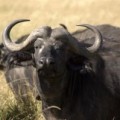The Amerindians of the western plains knew how to take full advantage of the buffalo, the most precious resource that nature had provided them.
Buffalo meat was their everyday fare, whether fresh or dried and-mixed with grease and supplemented with berries-made into pemmican. All parts of the animal were put to use, in a multitude of ways. The hide was used to swaddle babies, shroud the dead, cover teepees and make shields. In an environment where wood was scarce, the ribs made excellent sled runners, while the other bones and the horns were made into a multitude of practical objects. The tail was used to swat flies, and the dried excrement was used as fuel for fires.
Unfortunately, the European settlers' interest in buffalo hides led to the near-extinction of this species toward the end of the 19th century and caused the total disappearance of a way of life.

